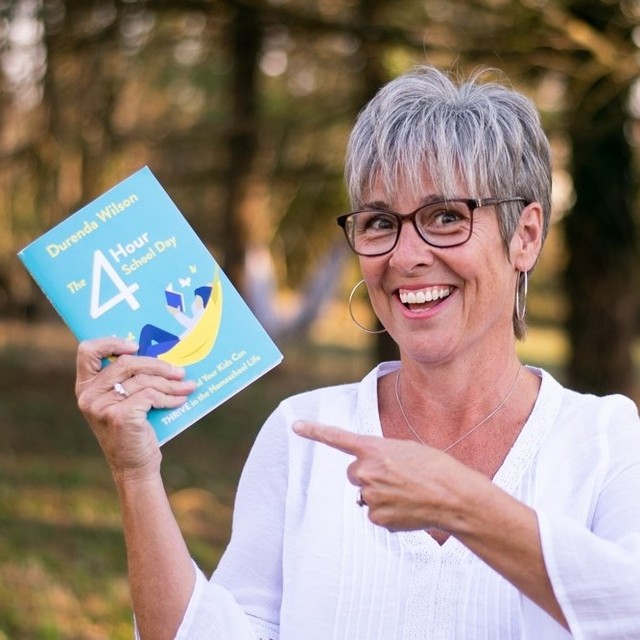This post contains affiliate links. Thank you for supporting the Homeschool Compass by shopping through our page!
Durenda Wilson is Mom to 8, Nana to 7, host of the Durenda Wilson podcast, and author of the brand new book, The Four-Hour School Day: How You and Your Kids Can Thrive in the Homeschool Life. In this conversation Durenda shares the homeschool routine that allowed her to give her children a high-quality education and manage a busy household, while at the same time providing her kids with the space and time to explore their own passions, take ownership of their own education, and grow into healthy, thriving adults. Durenda is just the kind of wise teacher we love to feature on the Homeschool Compass Podcast.
You can listen to my conversation with Durenda here. And be sure to check our other interviews with amazing guests like Sally Clarkson, Leslie Martino, and Kate Snow!
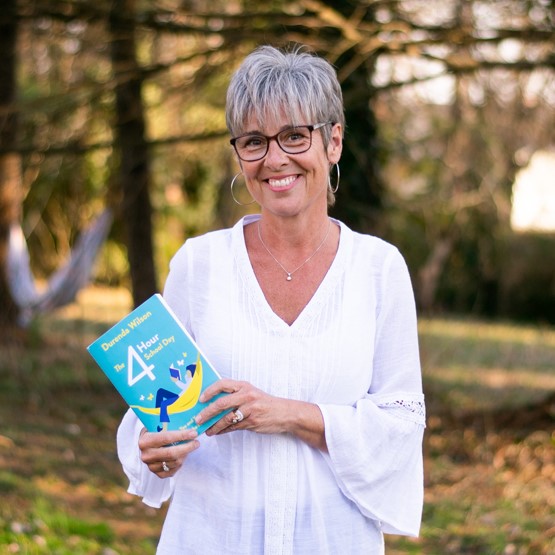
Follow the Homeschool Compass Podcast on Apple Podcasts, Spotify, or wherever you get your podcasts so you never miss an episode.
If you prefer to read your content rather than listen, check out these detailed show notes with time stamps to the podcast audio.
How Durenda got started with homeschooling (3:53)
Two things were pivotal in piquing Durenda’s interest in homeschooling: meeting a homeschool family with intelligent, witty, social children (of course, they were!) and picking up a book by Raymond and Dorothy Moore at a yard sale.
Durenda explains that the Moore’s gave her a vision for a different way of educating than she had ever thought possible. “It resonated with my heart for these kids that I hadn’t even had yet, so when my husband and I decided to get married I talked to him about homeschooling and he was fully on board. That’s how it all began.”
Durenda’s favorite memories of homeschooling (6:06)
Durenda describes the joy of looking back on her homeschool years:
I’m so thankful that I did what I felt that God was telling us to do, and my husband was in agreement, and we together agreed that this would be the best thing for our kids. And we did it in spite of what other people said. We did what we believed was best for our kids.
Durenda shares how she sent her children out to play outdoors every day, and they spent weeks and months building their own “civilization.” They each had their own property, their own property lines, they built their own houses, and even invented their own currency. Now as adults they look back on this time as pivotal in developing negotiating skills, money management, and a basic understanding of how to treat other people. She sums up by saying, “To me it’s such a beautiful picture of how our kids learn naturally when we give them time and space.”
What led you to write The Four-Hour School Day? (9:15)
Durenda was really moved by her desire to help families struggling with the educational system, who’s children aren’t thriving in public or private school, as well as homeschool families who are trying to replicate school at home and not finding it effective. She explains, “I wanted to write to encourage parents to takeback their kids education wherever they are in that journey.”
It’s such a privilege to be a parent. We get to be the ones to walk alongside our kids, and we can be the ones to cheer them on, and encourage them, correct them
She longs to help homeschoolers step fully into their God-given role as parents:
I think parents don’t realize is that their role in their children’s life is so, so important. And it’s not so that we can shape our kids into the image of what we want them to be. It’s really about working with the Lord and His plan for our kids so that they can be what He has called them to be.
Durenda explains that parents have a right to make educational decisions on their children’s behalf. “It’s not just a person that’s given them the right, or the state that’s given them that right. More importantly, it’s God. This role that we have in our kids’ lives is God-given, and when God gives us a job He equips us to do that job. It’s our responsibility to press into Him and to walk in obedience to Him and to take that responsibility seriously and fully, and move forward in confidence and faith that He is going to be with us every step of the way and give us wisdom every step of the way.“
In other words, this book is about building strong cohesive families just as much as it is about education.
What did the Four Hour School Day look like in your family? What was your family rhythm? (14:20)
Here’s what Durenda had to say about their family’s daily routine. “Yes, we very much had a rhythm, and even with one at one I still follow that same rhythm because it worked so well for us.”
Chores: “I am a huge fan of chores, because I believe that our kids learn so much through chores. It’s an essential part of our kids’ education.”
In episode 39 of the Durenda Wilson Podcast, Durenda shares more about Why Chores Are Essential.
Breakfast
Inspections: “You can’t expect what you don’t inspect is my mantra.“
Devotional time
Math, reading, and language arts: These were the family’s core subjects. Durenda notes, “In kindergarten through eighth grade, for us what worked well was science and history was something they learned as they were interested.”
Lunch, a clean up, and a little bit of a rest time:“That gave me a chance to regroup and pick up the slack of anything that didn’t get done. Or I can rest. Whatever I needed to do.”
Self-directed time: “I would send them outside, or sometimes as they got older I let them do quiet things in the house in their room like drawing. It was their choice what they wanted to do. What they did though needed to be productive. I wanted them to be using their minds and their bodies and their own motivation to find things to do and to create.”
Odd job time:
As she went about her day, Durenda would make a note of any extra little chores that needed to be done, a cupboard that needed to be cleaned for instance or a small repair that needed to be done. When her kids came in from their outside time, she would assign each child one of these extra chores based on their abilities and interests, and each child would work on his or her odd job for the next thirty minutes to an hour.
Dinner, clean up, and family time
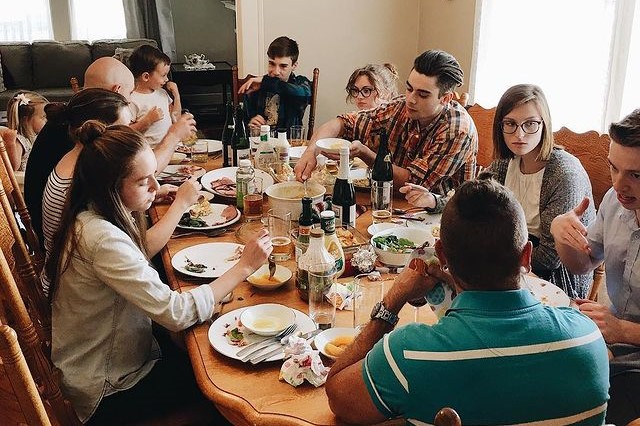
How did you help your children take ownership of their own education as they were moving into adulthood? (20:16)
Long before her kids got into high school, Durenda presented a high school diploma as something her kids would need to work toward, and that there would be certain credit hour requirements they would need to meet. She also gave them a lot of flexibility in how they wanted to meet those credit hour requirements.
Durenda consistently communicated to her children:
When you graduate and you get that diploma, that is going to because you did it, not because I drove you to do it. Once you get into high school, it is up to you to make it happen every day.
She had monthly check-ins with each high school student and gave them a progress report so there was some accountability, but she repeatedly stressed that they were the ones who needed to take ownership of their high school education.
Durenda also encouraged her children to find creative ways to meet their high school requirements. “I let them know that some of these credits could be met through their interests. Our oldest daughter was very interested in animals, taking care of animals, maintaining animals. She had milking goats and things like that, and she kept meticulous records and read endlessly about that. All of those things could count toward credits on her transcript. Learning how to translate real life experiences into credits I think is fun, and it’s challenging, but it also gives our kids a lot of freedom.”
As they neared high school graduation, Durenda helped her children find opportunities to explore potential career paths before committing to an expensive college program. For example, “We had one who did a short little internship to see if he liked the idea of becoming a physical therapist. He thought he wanted to be that, but when he actually went and experienced the job during an afternoon and watched all the paperwork that went with it, he didn’t want to do it anymore. And I thought what if we had sent him to college for seven years and then he got to the point where he was actually doing the job and realized he hated the paperwork?!”
Need some help creating a high school program for your child and taking advantage of the freedom and flexibility of homeschooling? Check out these 10 Options for Homeschool High School.
Durenda concludes, “The high school years are really, really exciting. I think it’s just important that we don’t get caught up in it has to look exactly like this and my kid has to go to college. There’s so many wonderful options out there now, it’s a great idea to really think that through and be more open minded and flexible.”
Durenda also talks about this extensively in her new book, The Four-Hour School Day!
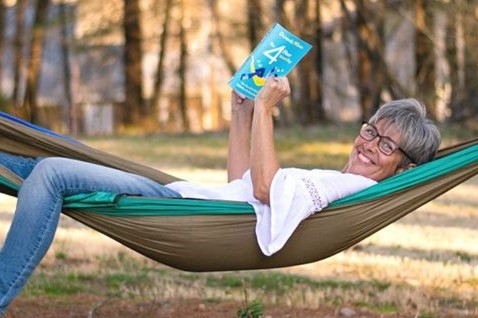
How can we let go of some of the baggage we might have around what school needs to look like so that we can take advantage of all the freedom homeschooling has to offer? (24:56)
Durenda describes how she leaned on the Lord’s leading. “For me, it was pressing into the Lord and listening, “Lord what do you have for these kids? What do you want for these kids?” I asked myself, if I could spend time with my kids and homeschool my kids and educate them the way that I really want to, shoving away everything everyone else is saying, shoving away my preconceived ideas. I realized I had a vision. I had a vision of what I really wanted to do with my kids, so I tried to stay true to that with the Lord’s help.”
Stress was a red flag for Durenda.
Every time she started to get distracted by comparison or fear, she would recognize that it was producing stress in her, and she let that be a red flag to signal her to return to the Lord so that he could guide her back toward what was lifegiving for her family. “I would go to the Lord and say, ‘Is this true? Am I not giving them enough?’ And He would bring me back to, ‘What is the heart that I put into you? What’s working for you?’ Recognizing what brings life into our families is so important.”
I really felt like most of the time it was just about me getting out of the way. Give them a safe, secure home environment where they’re comfortable and at peace. They’re not in crisis mode. And they will learn!
If you’re coming out of the public school, a period of deschooling can be very important.
Durenda recommends using this period to read some good books and educate yourself about how kids really learn. Books like:
- How Children Learn by John Holt
- Rethinking School: How to Take Charge of Your Child’s Education by Susan Wise Bauer
- And of course The Four-Hour School Day!
Durenda offers this encouragement: “If you’re a believer, there is freedom in the Lord. He has a good plan and purpose for your family. Don’t be afraid to just turn that over to Him and let Him lead the way. The Lord will order your steps. It’s just taking one step at a time, one day at a time.”
Homeschooling can be a team effort. When we’re telling them what to do, what to learn and when to learn it, that’s a classroom mindset. It’s not a discipleship mindset. We’re in a discipleship relationship with our kids.
What would you say to a parent wonders if they’re doing enough or who worries that this type of education might not be as rigorous as what their child would receive in traditional school? (27:30)
Durenda observed that we tend to put homeschooling under the microscope, but we need to put traditional school under the microscope as well. We sometimes assume children will get a more robust education in a classroom, but the evidence doesn’t necessarily bear that out.
Homeschooling offers individualized instruction.
First of all, “when you homeschool, there is a very small teacher to student ratio. That’s one of the number one predictors of success for a student. You want small classrooms. Well, what’s smaller than a homeschooling classroom?“
Homeschool parents are uniquely qualified.
“You love your kids more than anyone. You know them better than anyone. You’re more invested in their future than anyone. There are some great teachers out there, but they will never love your kids as much as you do. Or care as much about their future as you do.”
Homeschooling allows children to grow into lifelong learners.
“What is a robust education? It’s an education that works for your child where they grow up to be lifelong learners.”
Homeschooling equips children to thrive in real, adult life.
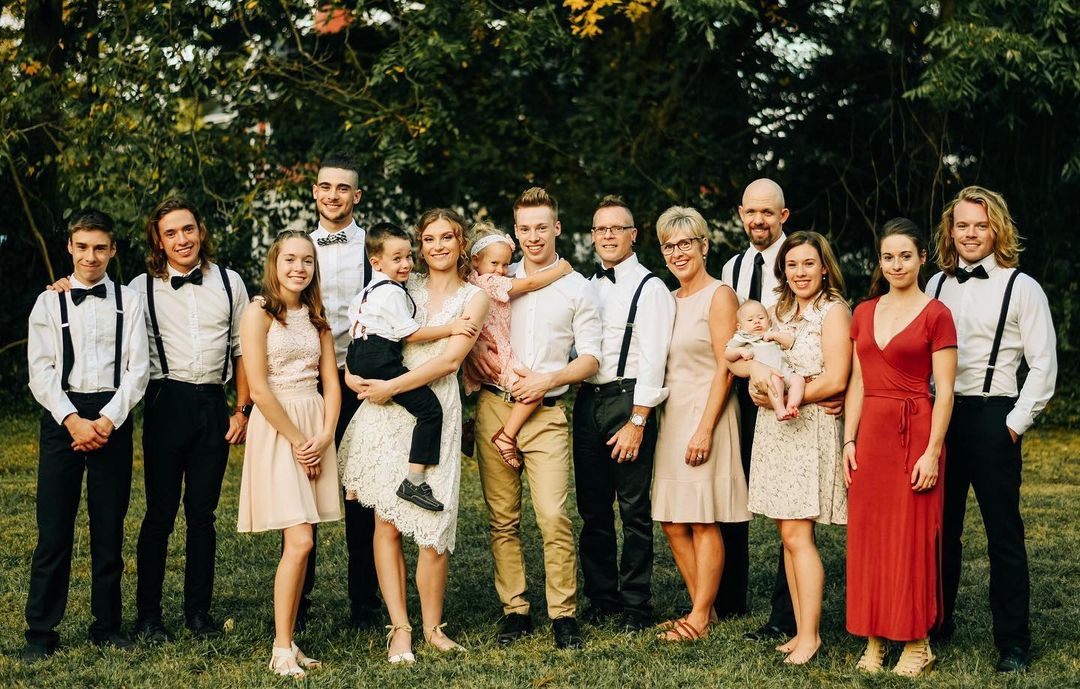
Having that strong cohesive family life has been one of the best ways that we have prepared our kids for real life. Living family life alongside each other, problem solving together, overcoming obstacles together. These are the things that grow healthy, resilient kids who can handle adult life well and make good decisions and be critical thinkers. That’s what we want at the end of the day. So I just encourage you parents, you can totally do this!
Final words of encouragement (33:19)
Durenda’s charge to parents: enjoy your kids!
“As you consider and embark on this journey, don’t forget to enjoy your kids. That’s really what it’s all about. At the end of the day, yes, we want our kids to be well-educated, we want them to be well-rounded. And yes, there’s hard work that goes into that. Don’t forget to sit back and enjoy them. They truly are a blessing. And have fun with them! I can honestly say we had a lot of fun along the way as we walked through our homeschooling journey.”
Connect with Durenda online.
- Read Durenda’s blog
- Listen to The Durenda Wilson Podcast
- Follow Durenda on Facebook and Instagram
And if you would like more encouragement and practical advice from Durenda, be sure to get your copy of The Four-Hour School Day today!
